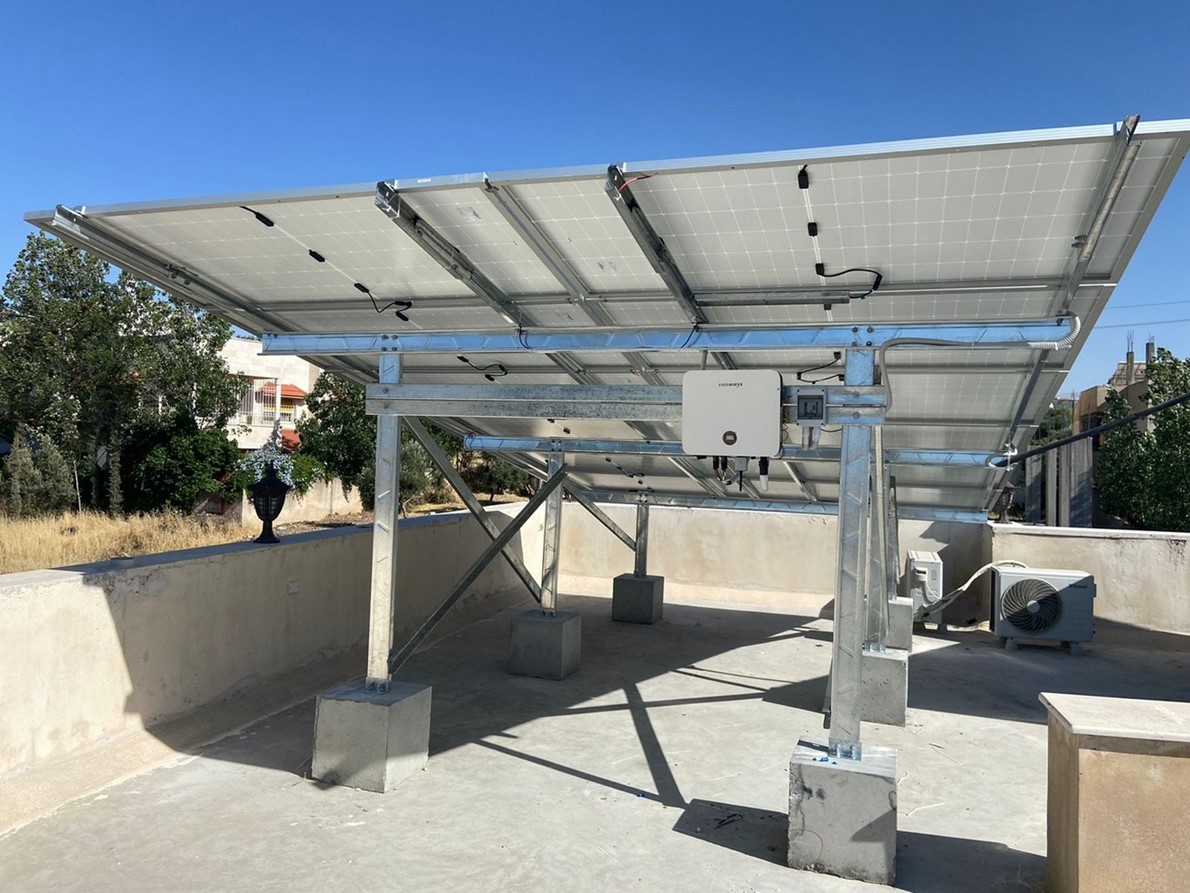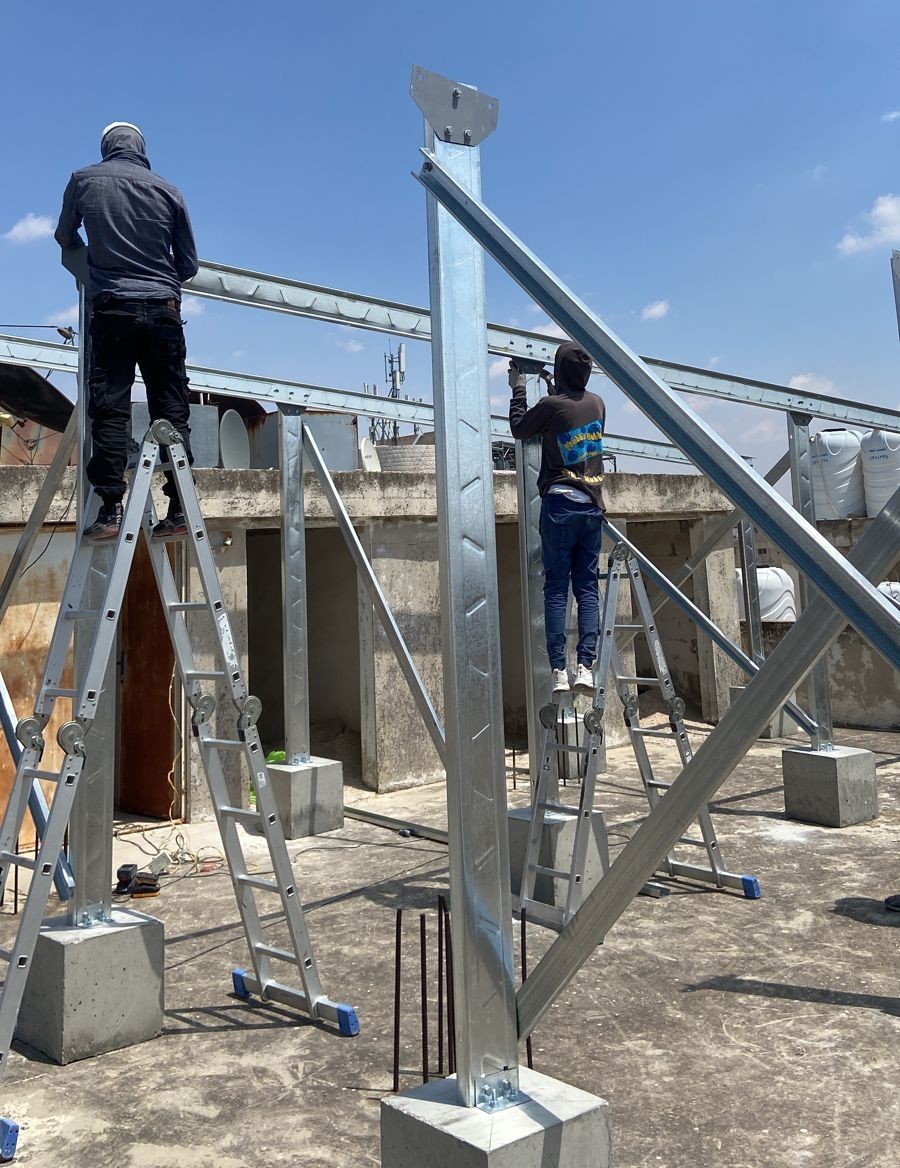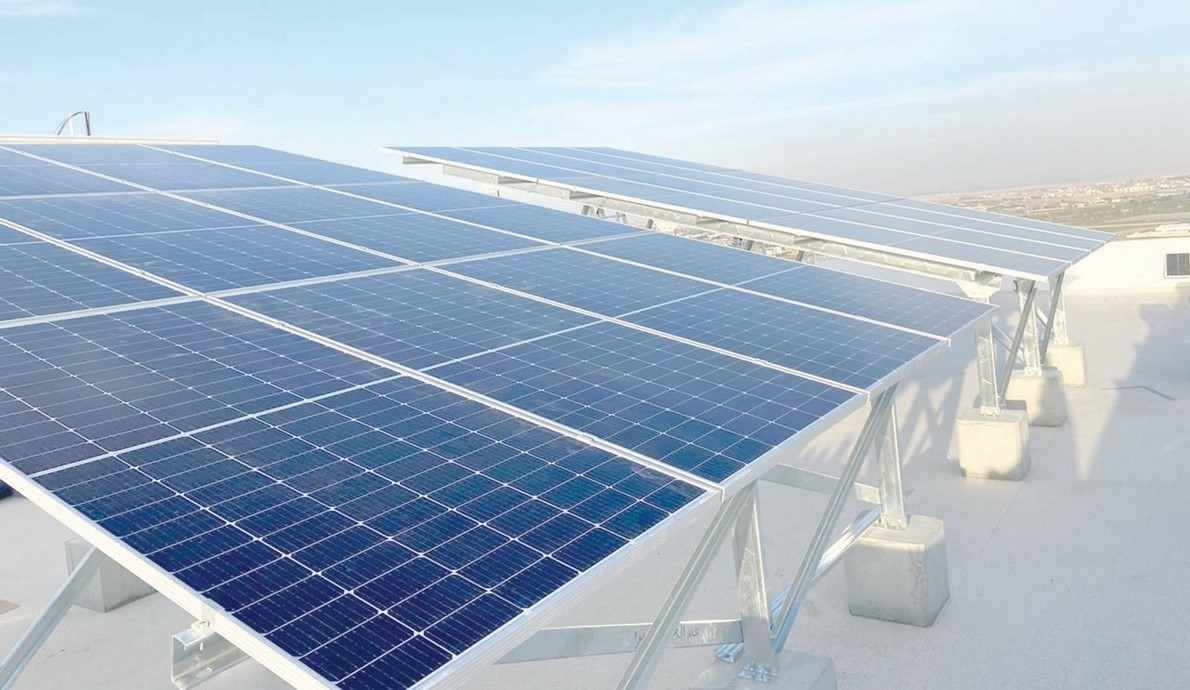Government tax on renewable energy is off-putting to Jordanians
Hazem Al-Sayyahin, ARIJ
last updated: Aug 25,2022

AMMAN —
Osama Al-Fayez regrets having installed solar panels on his rooftop to take
advantage of renewable energy as a long-term investment and cut the cost of
electricity bills.اضافة اعلان
“We got ourselves into a trap,” Fayez sighed as he described his experience with installing a solar energy system at his home.
“Despite being a simple employee, I managed to pay 3,000JD to install the system to save on my home electric power bills, but the opposite happened,” he sighed.
The government is levying JD2 on every kWh of power produced from renewable energy. The tax, part of a fee that came into effect last April 1, applies to households only, and is not applicable to the economic sector, hence, excluding factories, banks, and commercial enterprises from paying any form of tax on their generated green energy.
Fayez said the government’s tax discouraged individual efforts to transition to solar energy. He explained that had he known that he would pay a fee for the energy he generates for his household use, he would not have installed solar panels in the first place.

The government “cheats citizens by claiming it encourages renewable energy, and then it imposes a tax”, he proclaimed.
Alaa Al-Youssef had a similar experience. As he was also struggling with his rising electricity bills, he sold his vehicle two years ago, and used the money to install a renewable energy system to power his home at the cost of JD2,900.
“I saw people transitioning to renewable energy, but we were all cheated into it,” he said. He kept his subscription with the national electricity grid, as he said he might need to complement his energy needs in winter days, at a cost of JD20 to JD50 per month.
With the tax on renewable energy, his electricity consumption costs will be the same in the summer and winter. “What is the benefit of renewable energy, then?” he asked.
Youssef questions the reasons the state encourages people to transition to renewable energy by facilitating subsidized bank loans for that purpose, arguing that it is clean energy.
In Jordan, there are 400 companies working to install renewable energy systems. Of the total, 130 operate in the north, and 90 percent of the total specialize in the housing sector.
When the JD2 tax per kWh generated was imposed, demand for renewable energy systems dropped significantly to almost zero, rendering jobless the nearly 10,000 employees, namely administrators, technicians, engineers, and workers, and thousands of contractors, including drivers, day laborers, suppliers, and fresh graduates.
Rami Al-Freih, a spokesperson for the Renewable Energy Companies Association, criticized levying the JD2 tax per kWh. He said renewable energy for households represented only 20 percent of the total renewable power used in Jordan in 2020, the equivalent to what one mall consumes without paying the tax.
Freih says the subsidized electricity cost, which is a reduced rate as the government pays part of the bill, applies only to those consuming 3.6kWh volume and below.

Those wanting to harvest more renewable energy, and maintain their subscription to the national grid pay an unsubsidized fee of 120 fils per kWh, alongside the fixed JD2 per kWh.
Freih argued that renewable energy systems were not economically feasible. “If people install a 5 or 10kWh system, it will not cover their monthly consumption, and they will have to shore up their power needs through a subscription to the national grid at a higher and unsubsidized rate,” he said.
“It is better to get rid of the renewable energy system and apply for the subsidized rate that the government started applying from April,” he said.
The subsidized rates: 50 fils for 1–300 kWh, 100 fils for 301–600kWh and 200 fils per kWh for more than 600kWh.
The number of homes using renewable energy systems in Jordan reached 35,000, more than 80 percent of them will get the subsidized rates if they use the electricity grid. The remaining 20 percent of these system owners will pay the unsubsidized rate, if they tap into the national grid at a rate of 120 fils per kWh.
The head of the Energy and Mineral Resources Regulatory Commission, Hussein Al-Laboun, justified imposing the JD2 tax, saying that installing a renewable energy system is still very economical for citizens.
“We encourage their installation by consumers who spend JD200 per month on their electricity. With solar energy, that bill could be reduced to JD20 to JD30,” he said.

Renewable solar energy systems though, fail to produce at their full capacity during cloudy winter days, their owners would naturally need to tap into the electricity grid, Laboun explained.
This requires grid operators to put on line backup stations as owners of renewable energy systems do not accept spending any time without power, he added. “All of this come at a cost,” he noted.
Laboun explained that the goal “is not to punish or dissuade people from using renewable energy, but to encourage them. At the same time, we want to protect the electricity grid that has cost hundreds of millions of dinars, and we must sustain it.”
If the number of renewable energy system subscribers reaches 2 to 3 million, the electricity grid must be technically capable of accommodating the extra input to the grid, Laboun said.
That requires additional investments in the grid, and the Energy and Mineral Resources Regulatory Commission is consulting with third-party advisors on how to increase storage capacity coming on-line through renewable energy.
During this year’s Eid Al-Fitr, marking the end of the holy fasting month of Ramadan, renewable energy systems had to be disconnected from the grid as it did not have the capacity to accommodate the extra input.
The head of the Lower House’s Energy and Mineral Resources Committee, lawmaker Firas Al-Ajarma, said he believed that imposing the JD2 tax came as citizens are considered “the weakest link.”
This, he added, “is proof of the failure of those in charge of the energy sector, as they are imposing restrictions on the owners of renewable energy because they fear a repetition of last year’s blackout.”
The electrical network’s failure to maintain a fully redundant voltage supply could result in outing all production units and cutting off power to all transformers.
Ajarma said: “It is a contradiction that the JD2 tax was only imposed on small producers and consumers, not on major projects that were granted permits to generate 50 MW.”
He explained that the annual income generated from this specific tax did not exceed JD3 million, which is “considered trivial in terms of the state budget.”
Ajarma said he questioned the government on the issue, but did not hear back from it.
Minister of Environment Muawieh Al-Radaideh said the JD2 tax was imposed by the Ministry of Energy and Mineral Resources. He said his ministry encourages the use of clean energy because it helps reduce the nation’s carbon footprint, while preserving the environment and nature.
Dureid Al-Mahasneh, chairman of the board of EDAMA for Energy, Water, and Environment, said any tax on renewable energy is a tax on the environment.
He pointed out to complications related to licensing, which obstruct the process of installing solar panels. He blamed the hinderances on the government and electricity companies, in whose interest is to maintain the income from selling energy through the grid.
“Imposing taxes amounts to shortsightedness at the expense of clean environment, and the future development of renewable energy,” he said.
The procedure for submitting an application to install solar panels, according to the media spokesperson for the Irbid Electricity Company, Alaa Al-Qaraawi, requires submitting an application to the electricity company.
“The company may reject the application on technical grounds, such as the incompatibility of the connection to the grid, which may harm the applicants themselves, or others who live nearby,” he said.
But if an approval was given, Qaraawi added, “the contracted company may install the solar panel system and connect it to the household electricity breaker. The electricity company later inspects the system and connection points to ensure their proper operation and to calculate energy input and output.”
This story was published in collaboration with ARIJ.
Read more Features
Jordan News
“We got ourselves into a trap,” Fayez sighed as he described his experience with installing a solar energy system at his home.
“Despite being a simple employee, I managed to pay 3,000JD to install the system to save on my home electric power bills, but the opposite happened,” he sighed.
The government is levying JD2 on every kWh of power produced from renewable energy. The tax, part of a fee that came into effect last April 1, applies to households only, and is not applicable to the economic sector, hence, excluding factories, banks, and commercial enterprises from paying any form of tax on their generated green energy.
Fayez said the government’s tax discouraged individual efforts to transition to solar energy. He explained that had he known that he would pay a fee for the energy he generates for his household use, he would not have installed solar panels in the first place.

The government “cheats citizens by claiming it encourages renewable energy, and then it imposes a tax”, he proclaimed.
Alaa Al-Youssef had a similar experience. As he was also struggling with his rising electricity bills, he sold his vehicle two years ago, and used the money to install a renewable energy system to power his home at the cost of JD2,900.
“I saw people transitioning to renewable energy, but we were all cheated into it,” he said. He kept his subscription with the national electricity grid, as he said he might need to complement his energy needs in winter days, at a cost of JD20 to JD50 per month.
With the tax on renewable energy, his electricity consumption costs will be the same in the summer and winter. “What is the benefit of renewable energy, then?” he asked.
Youssef questions the reasons the state encourages people to transition to renewable energy by facilitating subsidized bank loans for that purpose, arguing that it is clean energy.
In Jordan, there are 400 companies working to install renewable energy systems. Of the total, 130 operate in the north, and 90 percent of the total specialize in the housing sector.
When the JD2 tax per kWh generated was imposed, demand for renewable energy systems dropped significantly to almost zero, rendering jobless the nearly 10,000 employees, namely administrators, technicians, engineers, and workers, and thousands of contractors, including drivers, day laborers, suppliers, and fresh graduates.
Rami Al-Freih, a spokesperson for the Renewable Energy Companies Association, criticized levying the JD2 tax per kWh. He said renewable energy for households represented only 20 percent of the total renewable power used in Jordan in 2020, the equivalent to what one mall consumes without paying the tax.
Freih says the subsidized electricity cost, which is a reduced rate as the government pays part of the bill, applies only to those consuming 3.6kWh volume and below.

Those wanting to harvest more renewable energy, and maintain their subscription to the national grid pay an unsubsidized fee of 120 fils per kWh, alongside the fixed JD2 per kWh.
| The list below highlights the amounts paid: | |
| Generation System | Monthly Amount |
| 3.6 kWh | JD7.2 |
| 10 kWh | JD20 |
| 20 kWh | JD40 |
| 50 kWh | JD100 |
Freih argued that renewable energy systems were not economically feasible. “If people install a 5 or 10kWh system, it will not cover their monthly consumption, and they will have to shore up their power needs through a subscription to the national grid at a higher and unsubsidized rate,” he said.
“It is better to get rid of the renewable energy system and apply for the subsidized rate that the government started applying from April,” he said.
The subsidized rates: 50 fils for 1–300 kWh, 100 fils for 301–600kWh and 200 fils per kWh for more than 600kWh.
The number of homes using renewable energy systems in Jordan reached 35,000, more than 80 percent of them will get the subsidized rates if they use the electricity grid. The remaining 20 percent of these system owners will pay the unsubsidized rate, if they tap into the national grid at a rate of 120 fils per kWh.
The head of the Energy and Mineral Resources Regulatory Commission, Hussein Al-Laboun, justified imposing the JD2 tax, saying that installing a renewable energy system is still very economical for citizens.
“We encourage their installation by consumers who spend JD200 per month on their electricity. With solar energy, that bill could be reduced to JD20 to JD30,” he said.

Renewable solar energy systems though, fail to produce at their full capacity during cloudy winter days, their owners would naturally need to tap into the electricity grid, Laboun explained.
This requires grid operators to put on line backup stations as owners of renewable energy systems do not accept spending any time without power, he added. “All of this come at a cost,” he noted.
Laboun explained that the goal “is not to punish or dissuade people from using renewable energy, but to encourage them. At the same time, we want to protect the electricity grid that has cost hundreds of millions of dinars, and we must sustain it.”
If the number of renewable energy system subscribers reaches 2 to 3 million, the electricity grid must be technically capable of accommodating the extra input to the grid, Laboun said.
That requires additional investments in the grid, and the Energy and Mineral Resources Regulatory Commission is consulting with third-party advisors on how to increase storage capacity coming on-line through renewable energy.
During this year’s Eid Al-Fitr, marking the end of the holy fasting month of Ramadan, renewable energy systems had to be disconnected from the grid as it did not have the capacity to accommodate the extra input.
The head of the Lower House’s Energy and Mineral Resources Committee, lawmaker Firas Al-Ajarma, said he believed that imposing the JD2 tax came as citizens are considered “the weakest link.”
This, he added, “is proof of the failure of those in charge of the energy sector, as they are imposing restrictions on the owners of renewable energy because they fear a repetition of last year’s blackout.”
The electrical network’s failure to maintain a fully redundant voltage supply could result in outing all production units and cutting off power to all transformers.
Ajarma said: “It is a contradiction that the JD2 tax was only imposed on small producers and consumers, not on major projects that were granted permits to generate 50 MW.”
He explained that the annual income generated from this specific tax did not exceed JD3 million, which is “considered trivial in terms of the state budget.”
Ajarma said he questioned the government on the issue, but did not hear back from it.
Minister of Environment Muawieh Al-Radaideh said the JD2 tax was imposed by the Ministry of Energy and Mineral Resources. He said his ministry encourages the use of clean energy because it helps reduce the nation’s carbon footprint, while preserving the environment and nature.
Dureid Al-Mahasneh, chairman of the board of EDAMA for Energy, Water, and Environment, said any tax on renewable energy is a tax on the environment.
He pointed out to complications related to licensing, which obstruct the process of installing solar panels. He blamed the hinderances on the government and electricity companies, in whose interest is to maintain the income from selling energy through the grid.
“Imposing taxes amounts to shortsightedness at the expense of clean environment, and the future development of renewable energy,” he said.
The procedure for submitting an application to install solar panels, according to the media spokesperson for the Irbid Electricity Company, Alaa Al-Qaraawi, requires submitting an application to the electricity company.
“The company may reject the application on technical grounds, such as the incompatibility of the connection to the grid, which may harm the applicants themselves, or others who live nearby,” he said.
But if an approval was given, Qaraawi added, “the contracted company may install the solar panel system and connect it to the household electricity breaker. The electricity company later inspects the system and connection points to ensure their proper operation and to calculate energy input and output.”
This story was published in collaboration with ARIJ.
Read more Features
Jordan News

